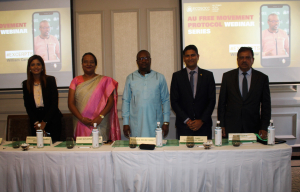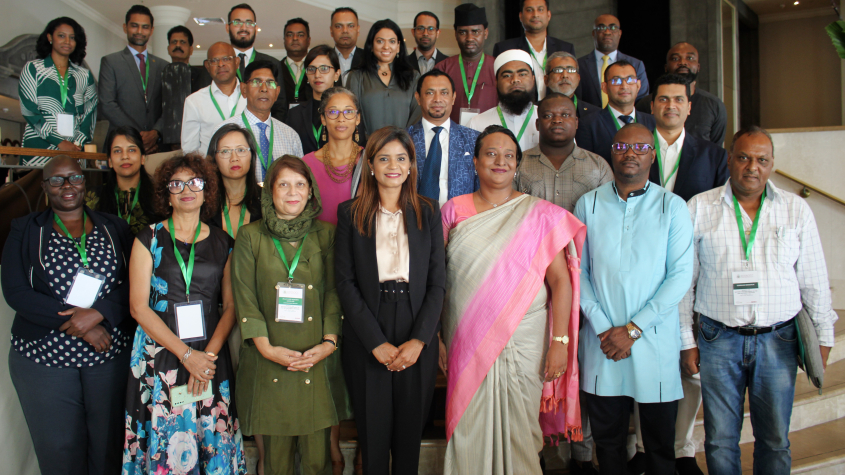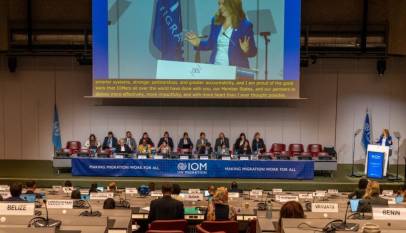ECOSOCC-GIZ: Engaging AU Member States on AU-Free Movement Protocol
In May, the African Union (AU) Economic, Social and Cultural Council (ECOSOCC), in partnership with Deutsche Gesellschaft fuer Internationale Zusammenarbeit (GIZ) GmBH hosted the second edition of their National Dialogue Series (NDS) on the AU Free Movement Protocol (FMP) in Port-Louis, Mauritius.

Migration in Africa is synonymous with human rights violations, insecurity and trafficking among others. To promote safe, orderly and regular migration in Africa, the African Union established the Free Movement Protocol (FMP) among other instruments. Also, the free movement of persons along with the African Passport is one of the flagship projects of Agenda 2063.
The FMP seeks to guarantee Africans’ the right to cross national borders for visit, trade, work and establishment. To this end, the Economic, Social and Cultural Council (ECOSOCC), and Deutsche Gesellschaft fuer Internationale Zusammenarbeit (GIZ) GmBH, which is implementing its activities on behalf of the German Federal Ministry for Economic Cooperation and Development (BMZ), launched the National Dialogue Series (NDS) on FMP in March 2023.
The series entails multi-stakeholder exchanges on the AU Free Movement Protocol (AU-FMP) with policymakers, lawmakers, CSOs, academics and the media across select AU Member States. The NDS is building upon the success of ECOSOCC-GIZ’s 2022 FMP Sensitization Forums, which sensitized African CSOs as champions of advocacy for the FMP’s implementation.
The first dialogue of the series was held in Lusaka, Zambia, in March 2023, followed by the second exchange held in Port-Louis, Mauritius in May, which featured conversations between different stakeholders, including parliamentarians, civic activists and academics, on Mauritius’ non-ratification of the FMP and actionable strategies to have it ratify and implement the Protocol.
In his opening remarks, William Carew, head of ECOSOCC Secretariat, said migration and human mobility were inseparably linked to the history of Africans, hence the need to protect the dignity of all African migrants within the continent against all challenges associated with migration, such as physical and sexual harassment at border crossings and insecurity which frustrates all efforts aimed at integrating the continent.
“In 2022, we organized the 2nd edition of our Young Africans Writing Contest on the theme of migration. Reading through the essays of our young boys and girls did bring tears to our eyes. Young people’s narration of the ill-treatment and sexual violence they face in the process of migration was so distressful,” Carew said, assuring the fact that AU FMP and related instruments would change this narrative.
Mr Carew said achieving the objectives of the AU-FMP will ultimately translate into less restrictive mobility for Africans within Africa, as well as spurring economic growth on the continent, thanks to improved entry, establishment, stay, and exit procedures for African citizens across countries of the continent. Thus, he called on all stakeholders not to remain insensitive to the tears and pains of African migrants.
“As an advisory organ of the AU, the ECOSOCC is committed to triggering debates on the topic of migration as well as advocating for the ratification of AU treaties in relation to labour migration and free movement. Aspiration 2 of the AU’s Agenda 2063 aims to among other things, achieve an integrated continent. This integration can only be meaningfully achieved through the free movement of people, capital, goods and services within the continent,” he concluded.
In his remarks, the Deputy Presiding Officer of ECOSOCC for Eastern Africa, Mr Mahendranath Busgopaul, stated that the successful implementation of the AU-FMP required concerted efforts by all stakeholders, i.e collective brainstorming, collaboration and inclusive dialogue among policymakers, parliamentarians, the civil society, the private sector and citizens as well.
“This dialogue is a platform for the sharing of insights, experiences and strategies that will accelerate the implementation of the FMP as well as an opportunity to delve into the key challenges hindering the effective implementation of the Protocol. Such challenges include border management, immigration policies, legal frameworks, infrastructure development and capacity building,” the ECOSOCC DPO said.
Against this backdrop, Mr Busgopaul described the dialogue as an opportunity to collectively identify innovative approaches and actionable policy recommendations that will accelerate the implementation of the FMP so as to guarantee the immense benefits of free movement to the people of Africa. “By embracing the principles of inclusivity, equity and justice, we can build an Africa where the movement of people becomes a catalyst for economic growth, social cohesion and sustainable development.”
A representative of Mauritius at the Pan African Parliament (PAP), The Hon. Subhasnee Luchmun-Roy agreed. She said all hands must be on deck to address the reservations of AU Member States about the FMP so as to attract the required signatures and ratifications for the all-important Protocol to come into force. “The FMP is like a coin; it has both a tail and a head, i.e it has advantages and disadvantages. The question is: do we need to review and realign the FMP to meet the diversity of the continent? Does it need a thorough rethinking or repackaging?”
The Hon. Luchmun-Roy wondered why the FMP which was adopted by the AU Assembly in 2018 had been signed by 32 AU Member States, yet only four countries took the necessary next steps to ratify the Protocol. The Mauritian lawmaker therefore decried the indecision of Member States on the ratification of the FMP, despite free movement being one of the flagship initiatives of Agenda 2063, one with the potential to exponentially increase intra-African trade and cooperation.
“Mauritius is among the few African countries where many African citizens can enter freely, others can easily acquire a visa on arrival, but this is not the case in many parts of the continent. I am also aware that my colleagues at PAP also require a visa to enter some AU Member States, even with an AU diplomatic passport. If a small [island] country like Mauritius can be daring enough to have such a policy, what is hindering others from doing so?” The PAP lawmaker queried.
In her keynote address, The Hon. Naveena Ramyad, the Chief Government Whip of Mauritius, described good governance at Member States level as a key benchmark for the realization of the ideals of free movement in Africa through the operationalization of the AU-FMP. Despite the challenges inhibiting the implementation of the FMP, she remained optimistic about the capacity of African policymakers and civil society to collectively overcome the hurdles that stand in the way of the realization of the Protocol.
“Mauritius is very committed to our African identity. The evidence is that our parliamentarians represent Mauritius in all regional and continental parliaments, such as SADC, COMESA, PAP and ACP. Our aim is to find commonality in the heterogeneous society that Africa is. Our commitment as a state is real and full-fledged, yet we also know that certain things are easy to happen while others, such as free movement, are difficult,” the Chief Whip stressed.
Mrs Ramyad said while some view the concept of free movement in Africa as a myth that cannot be realized, she strongly believes it is achievable and assured of the government of Mauritius’ commitment to always encourage its MPs in the various regional and continental parliaments to support any policy relating to the integration of Africa. “This dialogue will help us ascertain the practicability of this concept because having a document that cannot be implemented or operationalized makes it worthless,” Mrs Ramyad quizzed.
The ECOSOCC-GIZ Mauritius FMP dialogue will be followed by the third NDS segment come September in Nairobi, Kenya. Among others, the outcome of the exchanges was enhanced awareness about the FMP among Mauritian lawmakers, policymakers and CSOs and enlisting of their commitment to advocate for the signing and ratification of the Protocol. It also registered the parliamentarians’ commitment to participate in the planned Inaugural African Parliamentarians’ Forum on the FMP in 2024 as well as enhanced understanding of the FMP-AfCFTA linkage.














